The weather forecast for December 9, 2018, promised clear blue skies, light winds, and a calm sea, perfect for my start of rowing from El Hierro, a rocky island 240 miles off the African coast and the smallest of the Canary Islands. Family and friends had come to see me off on my first solo adventure, rowing singlehanded, without stopovers and without assistance from the Canaries to the Caribbean island of Martinique, a distance of some 5,400 kilometers. December was the recommended month for rowing the Atlantic, the end of the hurricane period, and the start of the tradewinds, a time, I was told, for “more secure and safer rowing.”
I am a retired military parachutist, now 51 years old, and in January 2013 I had lost three very close friends, soldiers killed in the same military combat. Losing them had left a lasting mark deep inside me; the sadness of their families was heartbreaking to witness. I wanted to honor them and all soldiers who had died in combat. I felt compelled to raise money for military widows and orphans, and so to do that, I decided to find sponsors and donors who would put their support behind a great personal challenge.
I gave myself 18 months for training, planning, and preparations, while exploring all the available avenues. Fundraising was my first priority, for both the crossing and the cause. I had to prepare myself physically and mentally for the challenge I’d set, and equally important, it was essential to have the support of a robust and reliable team behind me. Sailing was something I enjoyed, but rowing was new territory—I had only been on a few small kayak outings during my military career.
I acquired a boat, and it was a bonus that it had already proved itself seaworthy. Made of plywood and covered with epoxy and fiberglass, the boat had made four crossings from Dakar in Africa to Martinique, the first in 2006 and the last in 2014. The basic features were perfect. It was light, 1,000 lbs empty, 26′ long, and 5′ 3″ wide. I was delighted when the owner handed it over—a loan, he said, but “it does need a lot of work.”
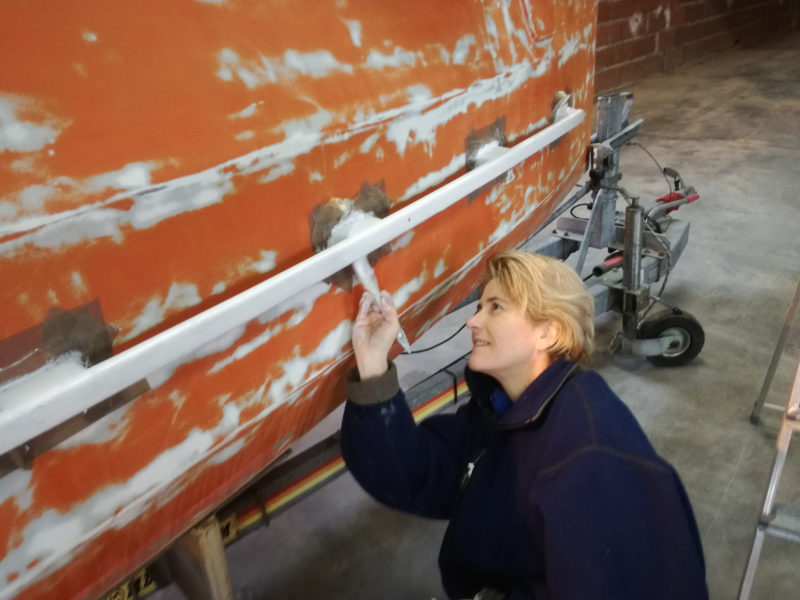 Photographs courtesy of Christophe Papillon
Photographs courtesy of Christophe PapillonVeronique, here applying the first coat of white paint on the handrails, painted all of the wooden elements on RKKD. We were lucky that the local town council allowed us to refurbish the boat in a spacious shed not far from home.
He was right, the basics were there, but the boat needed a complete overhaul. It had to be entirely stripped before any replacements could be made or rebuilding could take place. Renovation took place at my home in Toulouse, in southwestern France, with four of us working a total of 2,000 hours in our spare time. Doing the repairs ourselves meant more funds for the cause, and besides, it allowed me to better know my future oceanic home.
The first thing we did was to remove the entire interior, then thoroughly repaired all the cracks and holes of the hull. We continued with extensive work on the rudder and deck before tacking the electrical system installation.
We installed two batteries for storing the electricity from the solar panel; the desalinator, one of my most precious resources on the boat, would run off the batteries. I decided against an autopilot; it would have consumed too much electricity.
I named the boat RKKD after Denis, one of my deceased friends. A small chap with a great sense of humor, his nickname was Ree Kee, and “RKKDenis” was how he signed his name.
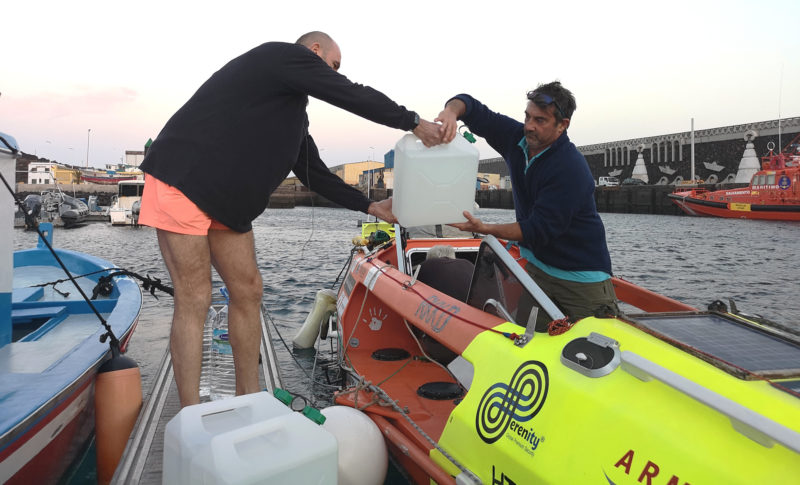
As we were loading the five plastic containers filled with water, it was essential to stow them correctly to get the right boat trim.
On embarkation day, my support team carried out their tasks rigorously, making last-minute preparations, checking equipment, and loading food supplies. Aware that the smallest technical problem could have enormous consequences, we made sure that all the electrical and safety systems and their backups were ready. RKKD was ready.
My singlehanded shakedown run in the unpredictable stretch of Mediterranean Sea between Monaco and Corsica had allowed me to make the final adjustments and improvements. My router, Eric Dupuy, understandably, wanted to check our satellite telephone system and back it up yet again. He would be my eyes, my ears, my only link at sea monitoring my progress and providing weather reports and routing advice at least once a day. Food supplies were the last to be loaded aboard: 40 days’ supply of military commando rations (balanced freeze-dried meals; just add water), 60 days of canned foods, some oranges, and onions. Although I had a desalinator, I also included 10 gallons of drinking water and three pairs of oars for security. Fully loaded, RKKD weighed 2,650 lbs.
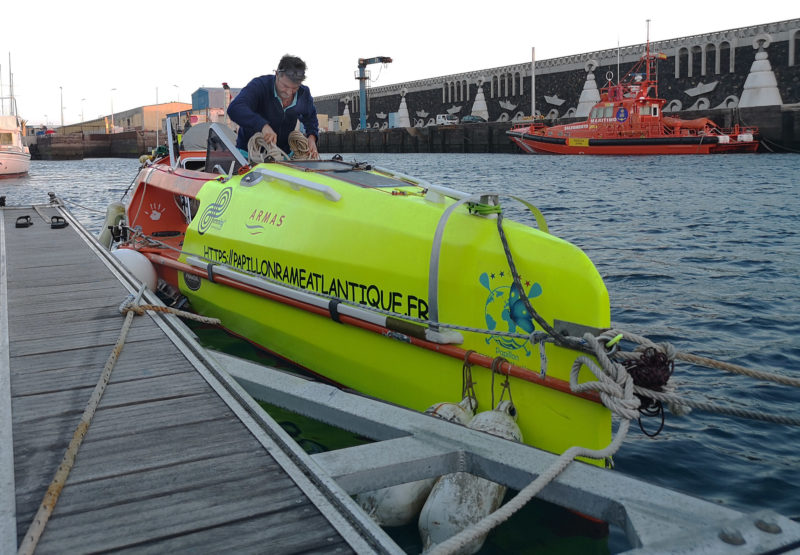
In the last few minutes before departure, I had verified my checklist and did some last-minute tweaking to have my load balanced and evenly distributed. Everyone appeared super calm, but I could hear my heart beating.
It was a very emotional goodbye to my partner Veronique; strong and loyal, she never once distracted me from what I’d set out to do. I heard my father, full of life and stoic as ever, say to a reporter, “I wish him good luck and pray to all the gods that he arrives safely.” The tow line was released, the tug headed back to the harbor, and I began my first day alone at sea.
With my adrenalin running alongside inevitable apprehension, I picked up my oars and faced the deep, mysterious Atlantic. I told myself, “All I have to do now is to get RKKD to the other side.” I was determined to make it, and in the process do as much as I could for the military families who had been left behind.
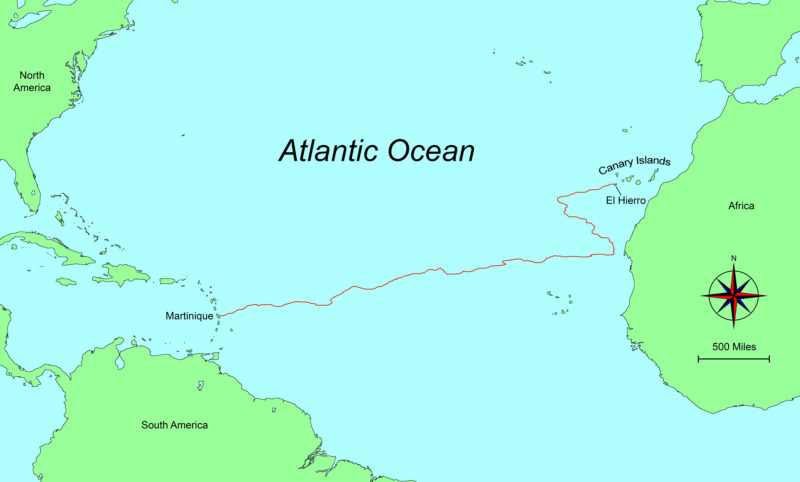 Roger Siebert
Roger Siebert.
I couldn’t have asked for better weather for the first 10 days; it gave me time to adjust to the constant sounds of the waves, and to get used to the effect they had on the boat. I rowed on average around seven hours a day with wind speeds around 10 to 12 knots, with waves 6′ to 10′. My body adjusted to the physical demands on the third day, thanks to my daily rowing practice before setting off. I could now row four hours nonstop, have a break for 10 minutes, then do another four hours.
All in all, I was pleased; I was right where I wanted to be with the tradewinds and their currents in my favor.
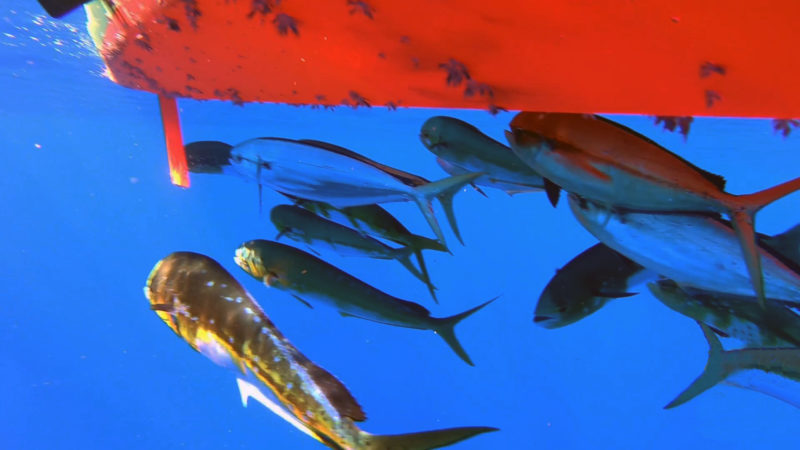
I would sometimes have about 40 mahi-mahi following me. During the day, they were multicolored and silvery, but at night they became almost white, and looked like ghosts.
However, I got caught up in plastic pollution that first week, which was disappointing. A piece of plastic had got caught up in the rudder. As if to make up for this human negligence, I had a surprise visit, one that I had been anticipating, yet it came as a surprise. Dolphins! They appeared first astern, and then in a flash they were both port and starboard, popping up from nowhere, leaping close enough to see their unwavering, impish smiles. They cheered me up so much that I had to stop rowing to watch. In seventh heaven for a good 10 minutes, I watched fascinated as at least 20 of these fabulous creatures leaped and danced.
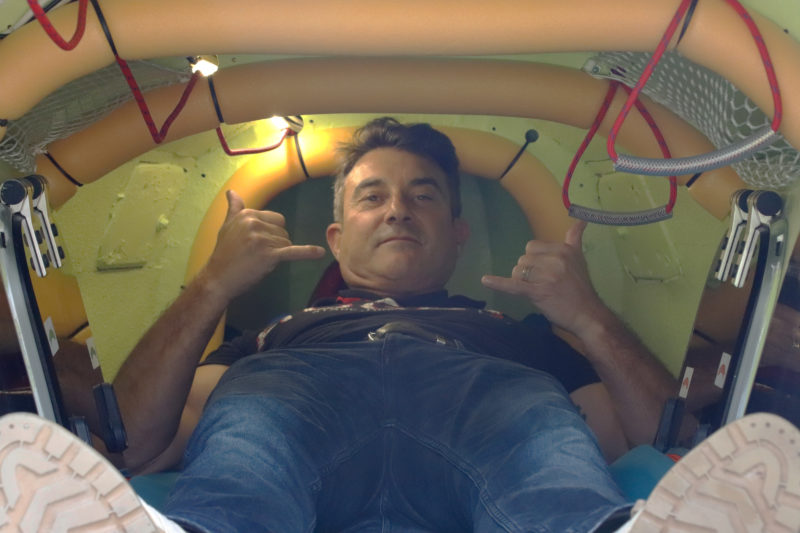
My sleeping quarters were a bit like a large tube with little headroom. The yellow foam pads kept me from hurting my head too much. I am glad that I’m not claustrophobic.
I’m fortunate in that I’ve never needed a lot of sleep, and aboard RKKD I could get by with just three to four hours. I was now sleeping mostly in a fetal position, with my back and knees leaning against the hull. Five minutes after waking up, I’d pick up the oars and row almost nonstop, allowing 10 minutes for meals. It was simple: if I didn’t row the boat, it would drift—and usually not in the direction I wanted to go. Living quarters were small and tight, so I had to be highly organized, putting things back where they belonged so they would be easy to find in an emergency.
Listening to music on my iPod became a regular pastime at any time of the day, from rock to pop, jazz, and even a bit of classical music. Hearing words of encouragement, prerecorded messages from friends, mixed in with the songs gave me that boost I needed. As a special treat, Veronique had included a few packets of my favorite biscuits and sweets, little things I didn’t consider bringing. These little luxuries had a massive effect on my morale, not only as I was eating them but long after. Being reminded of her pulled me out of the dull grind of my daily routine.
Eight days out, on December 17, I reported to Eric by satellite phone that I was 340 nautical miles from El Hierro. “Good going,” he said. I agreed. As I would soon learn, however, I couldn’t always rely on the trades.
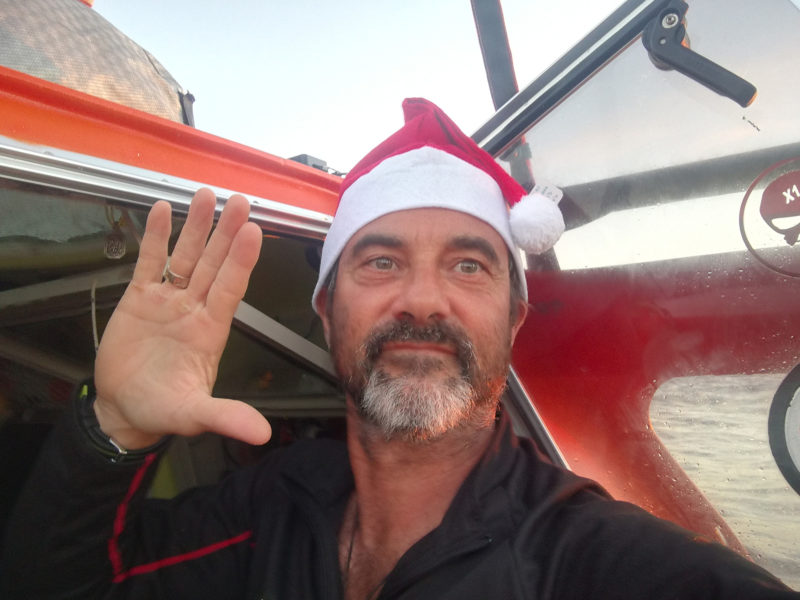
Thankful and relieved after my first brush with bad weather, I wished everyone a Happy Christmas. Little did I know there was more foul weather to come.
My first episode of lousy weather started on Christmas Eve, and it slowed me down for two days. I was caught in a storm and pushed backward by an adverse current. It took me two days of rowing to make up the lost ground.
I recuperated for two days, then got hit again by another bout of bad weather, which lasted four miserable days. Eric had warned me that I was in for a rough time with winds of 20 to 25 knots, so I was prepared for it. I rowed harder than usual, fighting not to get pushed backward too much. I wasn’t particularly perturbed at first, just a little peeved. I told myself if this were the only way I’d be tested, then it would be okay. By the end of the day, however, weather conditions had noticeably deteriorated with more swells and a menacing horizon.
The following morning, things got a bit more stressful. Eric called on the satellite phone, announcing more bad weather: “A depression for the next couple of days will slow you down considerably.” It wasn’t what I wanted to hear. Waves hit the boat, rocking me from port to starboard and back to port [as I rowed], and drenching me. I summoned all my courage and gripped the oars as if my life depended on it. Without a second oarsman or an autopilot to control the rudder, it was up to me to keep the bow straight and maintain the right course.
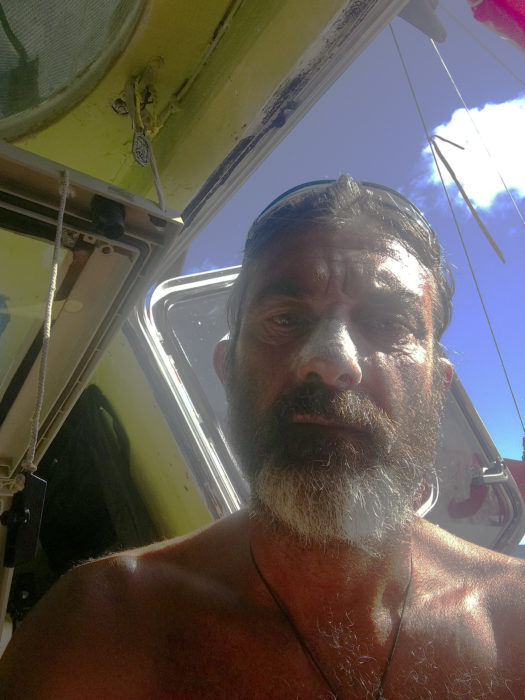
Eric had forwarded a message saying I looked like Robinson Crusoe. This selfie proved him right, but shaving was the last thing on my mind.
Navigating 12 to 14 hours a day took a toll on my body. I was suffering from tendinitis, and the anti-inflammatory pills I took for muscle soreness and fatigue didn’t seem to be working. The scene was surreal; waves were roaring with anger and hitting my face while I did my best to keep myself and my boat upright. God, I was having a bad time.
I decided to use the sea anchor to help stabilize the movement of RKKD and to prevent us from going backward. The time I’d spent learning about and testing this invaluable piece of equipment before the trip was definitely a good investment; set beneath the heaving sea, it worked well to keep the lost miles to a minimum.
Dejected, heavy-hearted, and alone under the gray skies and menacing seas, I had to admit I was lonely. I was begging for a change in the weather conditions. I thought of my father, who has always taught me the true meaning of commitment, excellence, and self-sacrifice. I thought of my deceased military friends, their wives and children now without them and who needed comforting. Wiping the sweat off my face, I raised both arms, imploring the skies, and hollered, “I’ve had enough! Stop blowing so hard! I have a mission!”
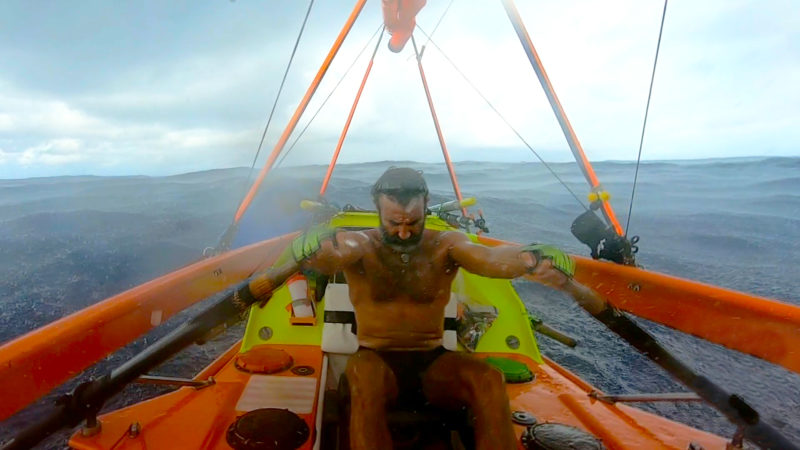
A rain storm that occurred while I was rowing allowed me to have a fresh rain-water shower. With tropical storms, I got a good salt-free soaking for an hour or so, then dried off in bright sunshine.
On the third day, realizing I had little choice but to stay calm, I stopped yelling. My only option was to continue fighting. I was alone, prey to strong winds, losing mileage every day, and doomed to drift.
I thought of Tom Hanks in Castaway, one of my favorite movies, where he was stranded on an inhabited island, and somehow, I found my courage again. But four days of constant bad weather had left me weary. Checking my position on the GPS didn’t help. On December 31, I was 100 nautical miles off the coast of Mauritania in West Africa. I had gone backward, and I had added 100 nm to the distance I had to row. My sore shoulders, glutes, and quads were stiff from exertion; I was physically exhausted and mentally drained.
On the last day of the year, waves of nostalgia washed over me and added to my bleak mood. I should have been holding hands and drinking champagne with Veronique on New Year’s Eve, but here I was, under gray skies, more alone than I had ever been. I had clocked 1,825 miles, but I still had 1,720 more to go. I tried to be rational, and told myself things could have been worse—the boat could have capsized. I had learned how to recover RKKD just in case, but RKKD had remained upright so far. I had painted her bright fluorescent orange—and the sponsor decals added to the hull were deliberately small so the boat would be visible to any rescue air mission.
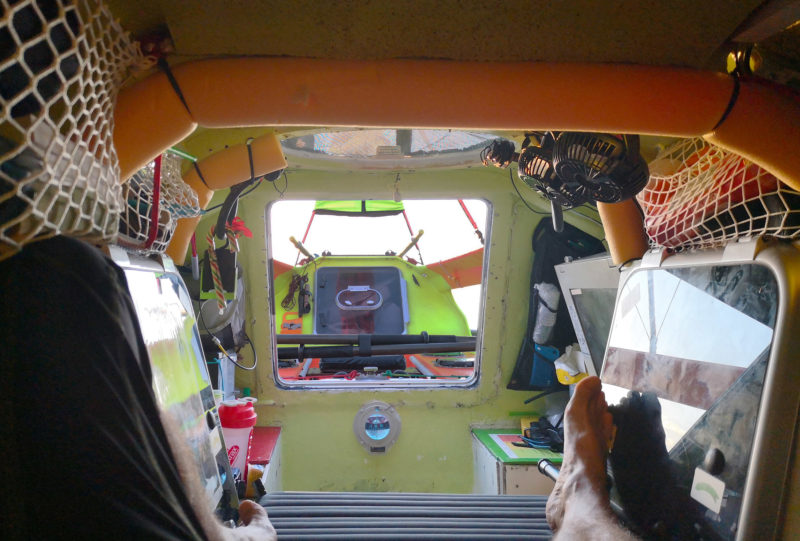
There wasn’t much to see inside the boat when I looked out from my cramped sleeping quarters. There was no lighting inside RKKD.
Missing Veronique and the comforts of home hurt like hell that night. I looked at the white-paint print of her hand on the orange cabin wall: I had pressed her hand there as we were painting, knowing it would help in moments like this. Remembering how she laughed and put her hand on my heart that day gave me the courage to wish a Happy New Year to all my friends, family, sponsors, and donors on my satellite phone call to Eric.
Just as quickly as the bad weather had started, the wind change I longed for and prayed for finally arrived. The sea, now released from the cycle of turbulence, seemed to breathe a sigh of relief. And so did I.
The wind, coming over the stern, was now in my face and pushing RKKD forward instead of holding her back. It had an immense effect on my morale and energy level. I rowed with renewed strength, and my stroke rate rose as the worry of nature’s adversities lifted. I started to see the benefits of increased miles and my morale continued to climb. The lesson I learned those last few days is that in a wild ocean, unlike in the army, we do not fight, but instead must adapt to the elements with patience.
My good luck continued a few days with a most unexpectedly unusual encounter. On my AIS (Automatic Identification System) screen, I picked up a vessel some distance away. I wasn’t sure its crew seen me. I was, after all, only a low-lying rowing boat that might not have registered on the ship’s radar. I certainly wanted to avoid a collision, so I radioed the captain. It was apparent he wanted to chat, probably intrigued at the sight of a lone, disheveled figure rowing in the middle of the Atlantic. As the ship approached, the captain talked to me from his observation platform inquiring after my health, my morale, and finally asking why I was doing what I was doing.
Then, to my great surprise, he asked if I’d like to have some fruit. I happily accepted his offer. As the Panamanian-flagged vessel NORDKAPP drew within hearing range, I shouted, “I am very happy to see somebody; it’s been 48 days since I’ve seen anyone.” My voice sounded raspy and rusty.
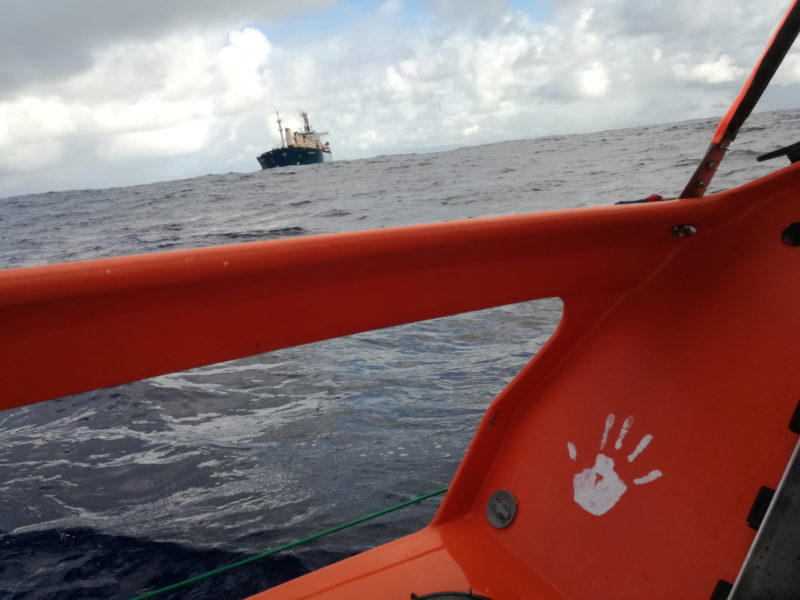
The vessel NORDKAP approached RKKD as the captain and I talked over the radio. His kindness and generosity during this contact after my hazardous spell of lousy weather brought me immense relief and comfort. The handprint on the cabin wall is Veronique’s.
I wondered how I would manage to receive the delivery of a package. Thank goodness they didn’t leave it to me; I stayed where I was and watched their brilliant ship-handling. NORDKAPP first came toward my starboard side, sailed beyond RKKD, then lined up on her port side. Maneuvering to get close enough was tricky and took a good 15 minutes. At a distance of about 50 yards, crew members then lowered a blue canister wrapped in plastic on the end of a long line and set it in the water. It slowly came closer and I picked it out of the water. The crew retrieved the line, and job done, the NORDKAPP didn’t hang around—a quick honk on the horn and off she went.
I opened the canister and I found several containers. When I opened the first, I was overwhelmed by a savory aroma, which turned out to be a freshly cooked omelet. In a jam jar was some saucisse rougail of creole sausages, tomatoes, and fresh herbs to have with my omelet.
I hadn’t heard the captain clearly and had mistakenly heard “fruit” when he had actually said “food.” I radioed my thanks, my mouth already watering over this unexpected banquet. Hot and tasty food! I wolfed it down in no time. There were chocolates too—a box containing 15 Ferrero Rocher chocolates, those special ones that only appear at Christmas. I decided I would ration these and reward myself with one chocolate for every 25 miles made good toward Martinique.
Weather conditions had now stabilized, thank goodness, and I wasn’t preoccupied with safety and navigation and had time to reflect. In a world where we are continually being bombarded with outside interference, we don’t often get the chance to be completely alone in the natural world. I was lucky to enjoy beautiful marine life: to have dolphins jumping around me on several occasions, to have seen five or six whales…one had even come close up to the boat, staying for a good five to ten minutes.
Keen for RKKD to have a clean bottom for efficient gliding through the water, I scraped the hull every 10 days, and it was during such maintenance that I discovered why the dolphin fish (also called mahi mahi) almost always accompanied me. These colorful fish fed off the microscopic organisms and barnacles attached to the bottom of the boat. I was going slowly, so gave them shade and provided food. There were smaller things as well. Night rowing gave me the chance to marvel at noctiluca, those tiny microorganisms that light up at night. They accompanied me, shedding a lovely pale blue light as I swept my oar blades through the warm waters. Equally magic were those starry nights in an utterly clear, dark sky, the luminous streak of the Milky Way stretched out across it, and the warm, vibrant colors of sunsets and sunrise. These were my landmarks on the expanse of the ocean.
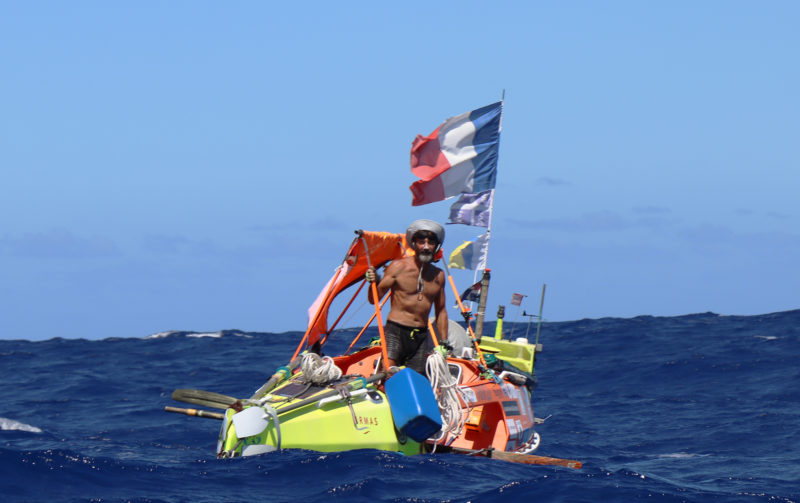
This is the first photo taken from the first boat that came out to greet me. Muscles sore, I still had another four hours of rowing to officially finish the crossing.
My arrival in Le Robert, a harbor town on the east coast of the Caribbean island of Martinique, on February 10, was phenomenal. Throngs of people crowded at the jetty waved and cheered; it seemed the whole town was there to greet me. It had taken me 64 days to row across the magnificent Atlantic; I had rowed a total of 2,900 nautical miles.
I had a moment of panic when I first saw land as I realized that my legs felt weak. Would I be able to walk straight? Sweating, aching all over, my pulse racing, but bursting with joy, I finally spotted Veronique and next to her my father. Holding Veronique in a warm embrace and sitting down for a real meal with friends and family who cared was all that mattered now.
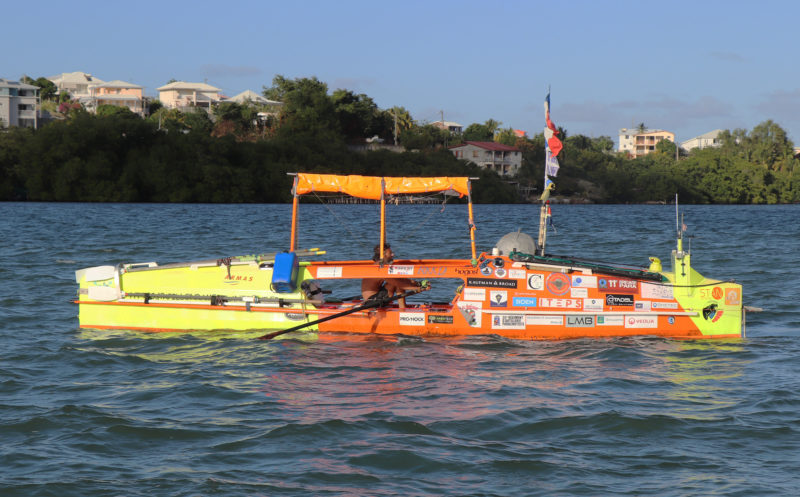
As I finally arrived at my landfall I felt liberated. The sea was tranquil and a beautiful blue; a fair bit of wind made my landing somewhat tricky but its rush in my ears was sweet music to me. I was safe.
I’m sometimes asked what lesson I learned from this achievement. I can genuinely say that I learned a lot about myself. But the most obvious is that this crossing alone shows that we can unite people around us if the cause is beautiful. A solo trip is, in fact, a tremendous collective adventure. I had accomplished my mission to raise funds for the wives and widows who had lost their husbands and fathers. But I couldn’t have done it alone. Through donations and sponsors, we were able to give over $91,000 to a very worthy cause, much more than I’d hoped for.![]()
Christophe Papillon spent his childhood on the island of Corsica and in Saint Mandrier on the south coast of France. He discovered his love of the sea through his father and his dream of adventure developed while watching the explorer Jacques Cousteau and his ship CALYPSO. He spent 21 years in the army as a parachutist and a parachutist commando. Losing military friends killed in action moved him to honor their memories and help their families. He has traveled extensively, to more than 90 countries. To continue raising money to support military families, he is preparing an unassisted solo crossing of Antarctica on foot.
Freelance writer Alice Alech writes from her home in the south of France.
If you have an interesting story to tell about your adventures with a small boat, please email us a brief outline and a few photos.
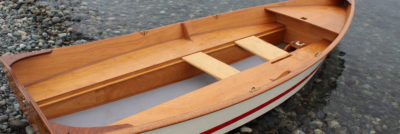
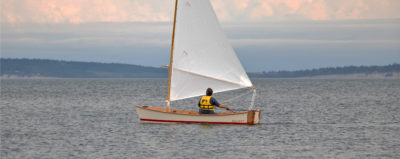
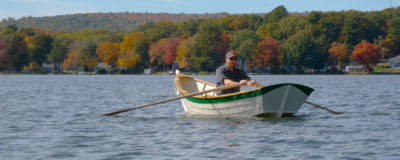
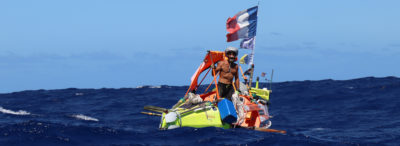
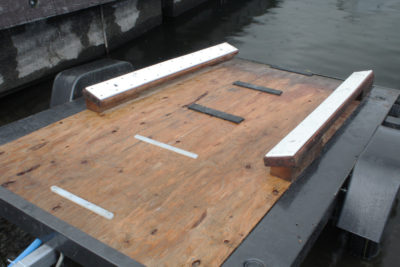
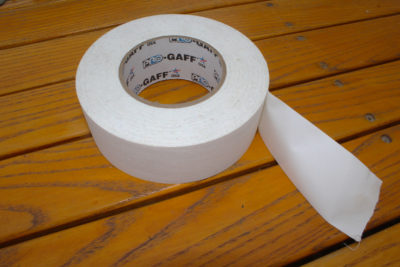
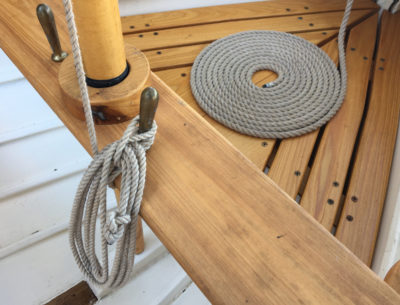
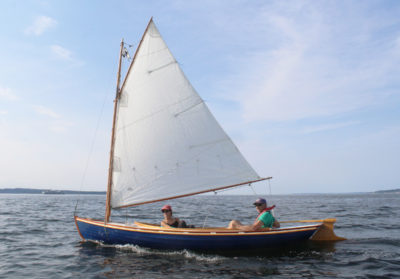
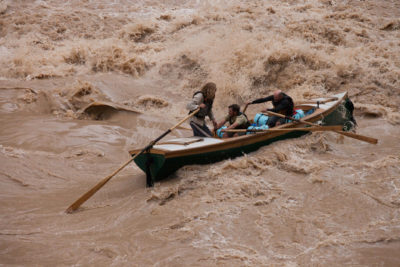

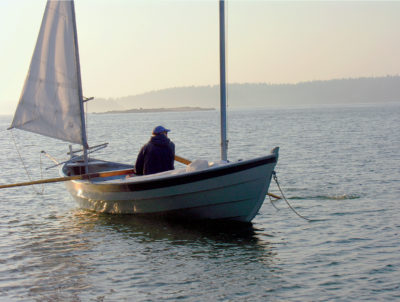
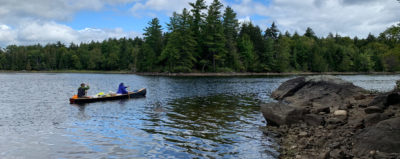
Wow. Terrific yarn.
Terrific traversée! You can be very proud of your rowing (incredible) adventure. Incroyable!
Thank you. You can follow the next adventure at my web site, http://www.papillonantarctique.com
(It’s in French but some web browsers can translate it into English.)
Thank you for your courageous and tender recounting of your fantastic voyage. The handprint was precious and brilliant at the same time. Best of luck to you in Antarctica.
J’ai beaucoup apprécié le récit de votre “folle aventure” qui été réfléchie et qui partait d’un très bon sentiment envers les familles de vos amis militaires.
J’avais l’impression de sentir les mêmes souffrances que vous au fur et à mesure de la lecture. Heureusement que vous êtes arrivé à bon port.
Je pense que vous vous souviendrez longtemps de cette omelette chaude offerte par le commandant du bateau panaméen. Quelle excitation vous avez dû avoir en réceptionnant ce colis.
Merci à Alice ALECH pour nous avoir fait partager ce voyage
Online translation:
I very much appreciated the account of your “crazy adventure,” which was thought-out and which started from a very good feeling toward the families of your military friends.
I felt like I was feeling the same pain as you as I read it. Fortunately, you have arrived safely.
I think you will remember this hot omelet from the captain of the Panamanian boat for a long time. What excitement you must have had when receiving this package.
Thanks to Alice Alech for sharing this trip with us
Thank you so much for these lovely comments. All very much appreciated.
I loved reading about this crossing. Amazing achievement, well done.Truly impressed.
Absolutely amazing ordeal/adventure. It was absolutely an amazing achievement, seemingly in this day and age, practically impossible. Heartiest congratulations indeed are warranted.
Alice,
A courageous journey by an amazing man, narrated with simplicity.
Rita
Exceptional, heroic Christophe.I become small when I think of my 8-day rowing trip from Pavia to Venice. Is it possible that I saw the boat in La Gomera?
You did good.